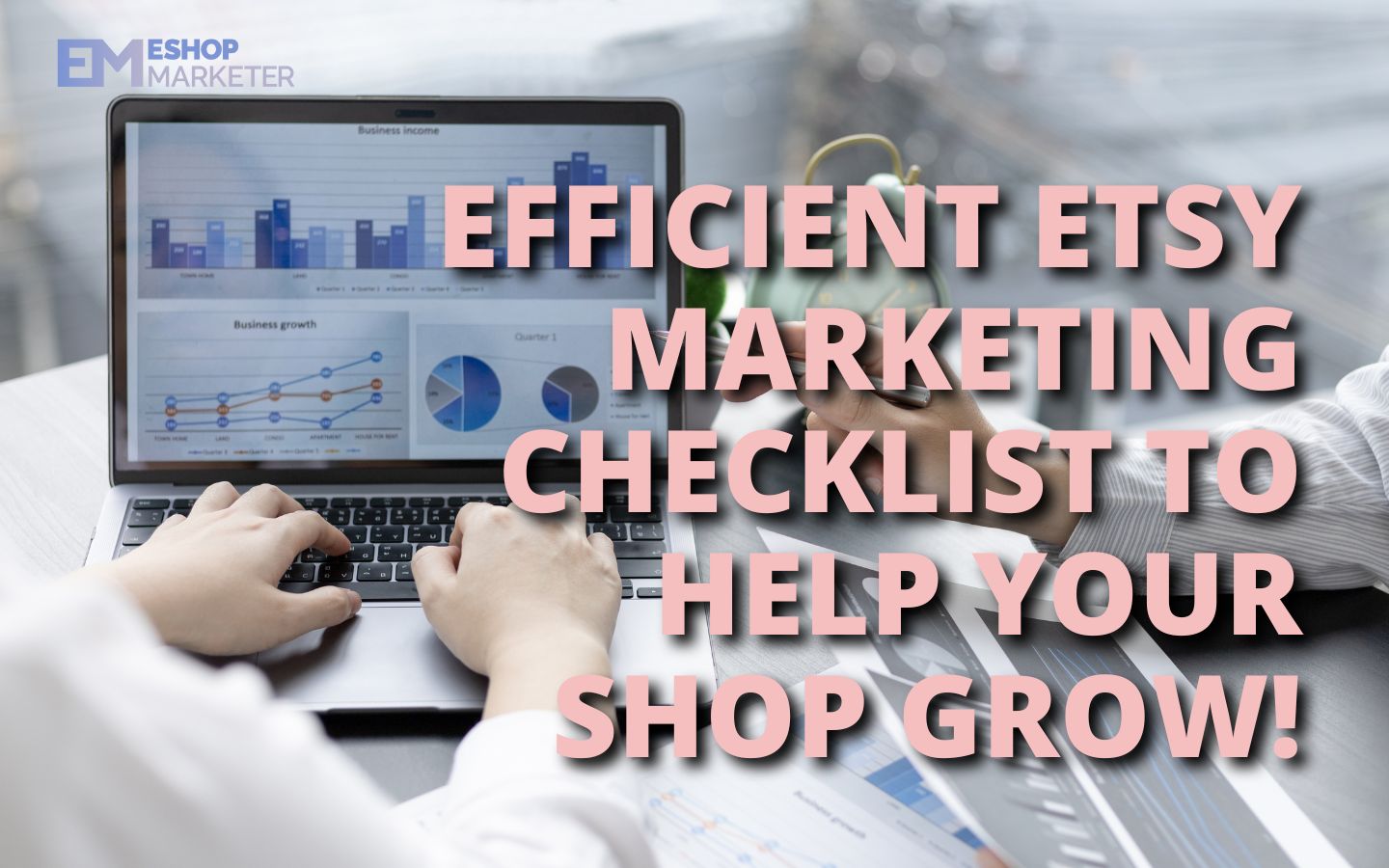Etsy Marketing is an essential aspect of running a thriving Etsy business. Even if you create the most brilliant product, no one will buy it if no one is aware of it. Effective marketing solves this problem by increasing brand awareness and establishing your reputation. This, in turn, aids shoppers in discovering your products, fosters buyer confidence and trust and leads to sales.
Setting the Stage for a Successful Etsy Marketing Campaign
Making a Etsy marketing plan is an excellent way to ensure you reach the right customers at the right time. An annual Etsy marketing calendar can assist you in planning for the entire calendar year while focusing on the most important seasons for your business.

Recognize Your Target Customer
Determine who is most likely to buy from your store—knowing how and why your targeted market buys will ultimately determine which marketing strategies will result in the most sales.
Discover Your Brand Voice
Your target buyers will require a solid reason to pick your product over another on the market. Create a strong brand identity for your company by setting clear expectations and consistently meeting them. Use images, words, and actions to communicate your distinct brand promise.
Consider Seasonality
Make an extra effort to capitalize on your shop’s busiest seasons. Conduct market research and review your statistics to determine when your products are most marketable.
Set Goals
Before you start a new Etsy marketing campaign, think about what you want to achieve. Choose one or two marketing metrics to monitor: engagement, awareness, subscribers and followers, sales, visits, or conversion rate.
Measure Your Success
Once you’ve decided which metrics to focus on, keep track of where they are now and where you want them to be in a month. Whether you want to enter numbers into a spreadsheet or scribble them in a notebook, you’ll need to know where you started to learn from your data later.
Etsy Marketing Research Tips
Improve your competitive edge and Etsy marketing efforts by learning more about your customers’ needs, wants, and nuances.

Do It Frequently
Make market research a regular part of your routine to gain the meaningful insights you need to make informed, strategic decisions about your business, marketing, and products. Examine data from your Stats and social media sites, read customer reviews, hold focus groups and surveys, and observe customers’ online and in-person behavior.
Keep an Eye on What Sells and What Doesn’t
Keep a close eye on what inventory is moving quickly through your shop and determine why it’s selling at a higher rate. Examine your search terms list in Stats to see which high performers drive the most traffic to your store, and consider expanding your product line based on those top sellers.
Obtain Data from Customer Questions and Habits
Paying attention to the details your customers share via email, conversations, and social media can help you inform and update your product portfolio. Every interaction with your customers can help you better understand their specific needs.
See What Customers Are Saying in Reviews
Include a brief note in the Message to Buyers section of the Etsy order confirmation email encouraging buyers to leave feedback. Buyer feedback will not only help convince new visitors to your shop but also help you learn more about your customers’ expectations.
Increase Your In-Person Efforts
When you show off your products in person at craft fairs or pop-up sales, note what piques customer interest—what you discover may surprise you. In-person interactions are a remarkable opportunity to put a face to the vague definition of your target market when you’re primarily an online business.
Understand Relevant Lifestyles Through Social Media
Consider social media as a channel for direct communication with customers. To ensure future success, keep a close eye on which posts generate more conversation than others. Every social media platform can help you discover new and interesting things about your industry.
SEO Strategy
Online shoppers rely on search to find the products they want to buy. Using keywords and SEO best practices to optimize your site can help you rank higher in search results.

Use Keywords to Get Found
To increase your chances of being found, use keywords at every opportunity. Including a variety of keywords throughout your site, including your About page, category and product pages, and blog, informs search engines about your site and allows them to show your page to users who search for similar terms.
Choose the Right Keywords
It is critical to select keywords that accurately describe your site’s pages and what visitors will find there. Keep your keywords relevant to the pages on your site. You can generate keywords by entering a few words or the first few words of a phrase into Google and seeing what related phrases other people are searching for.
Increase the Amount of Content on Your Site and Share It on Social Media
Creating content for your blog is one of the most effective ways to boost your search engine rankings. Concentrate on creating content that will catch shoppers’ attention or meet the needs of anyone searching online. Search engines determine that content is of high quality when it is discussed, shared, and linked to. Social media is an excellent platform for promoting your content. Sharing links to your website or blog on Twitter, Facebook, Pinterest, Instagram, and LinkedIn can show search engines that people discuss your products or content.
Create Buzz to Get Backlinks
When other websites link to your domain, your site’s reputation improves, and your search ranking improves. Links from other websites, also known as backlinks, significantly influence Google’s ranking algorithm.
Market on Social Media
Social media is one of your most effective low-cost promotional tools as a small business owner. By harnessing the power of social media marketing, you can grow brand awareness, connect with customers, and reach new potential buyers.

Concentrate Your Social Media Efforts
Each channel has its strengths and weaknesses, making it suitable for different promotion types. Consider what kinds of promotions you intend to create and which platform would best fit your company before launching a social media campaign.
Cater to Your Social Channel
Your campaign strategy should be based on the channel you’re using. A campaign created for Instagram will be very different from one created for YouTube.
Make a Social Sharing Calendar
Creating an editorial calendar will assist you in producing consistent, high-quality content while making collaboration with guest contributors easier as your business grows. When creating your posting schedule, aim for consistency and content balance.
Collaborate with Influencers
Working with influencers offers their endorsement of your product, which can help you attract the attention of a larger audience. You can collaborate with an influencer to drive traffic to your business in various ways, including social takeovers, product exchanges, and custom collaborations.
Create a Following
Growing your social media audience extends the reach of your carefully engineered content. Spread the word online and offline, use hashtags to attract a larger audience to your content, and connect with customers through comments.
Optimize Your Campaign with the Help of Analytics
Examine when your target audience most likely sees and interacts with your posts. Learn about your audience by monitoring site traffic and customer time zones, reviewing best practices for scheduling by channel, and using scheduling tools to automate your process.
Grow Your Etsy Shop with Blogging
Blogging allows business owners to tell their brand’s story, build credibility as an expert in their niche, and even bring in more potential customers. Choose your platform once you’ve decided to take the plunge. Blogger, WordPress, Tumblr, and, if you use Pattern, the Pattern blog are all popular options.

Create a Content Calendar
Making an editorial calendar will assist you in establishing a steady rhythm that works for you. To help guide your content, conduct audience research and consider what topics you would like to write about.
Establish an Audience
Use relevant hashtags when sharing on Facebook, Instagram, or Twitter, and collaborate with matching shops for cross-promotion or joint giveaways to grow your brand’s following. Cross-linking and composing SEO-friendly blog post titles will help your target audience find you.
Creating Email Newsletters
Through email marketing, you can provide your customers with a fresh method of staying connected to your brand. Delivering rich content and enticing updates in a scalable and efficient manner is a direct way to establish your brand and nurture an ongoing relationship with customers.

Establish a List
Obtain a large number of interested subscribers by asking them to sign up on your website, through social media, or even through a physical sign-up form at a craft or trade show. You can encourage customers to subscribe by providing an opt-in discount or promotion.
Start Creating Your Content
The content of your email updates is heavily influenced by your current brand and the interests of your target audience. Make a list of all the various types of news, updates, and content you could send to your new email subscribers. To help you evolve your content over time, try a few different approaches and evaluate their performance.
Send on a Schedule
The frequency of your email newsletter will be determined by how frequently you have new content to share. Aim for no more than once per week, and no less than once per month, and be consistent.
Want to stand out from competitors selling similar products as yours? Read this blog post here!
Visit howtosellonetsy.com for more Etsy selling tips!


